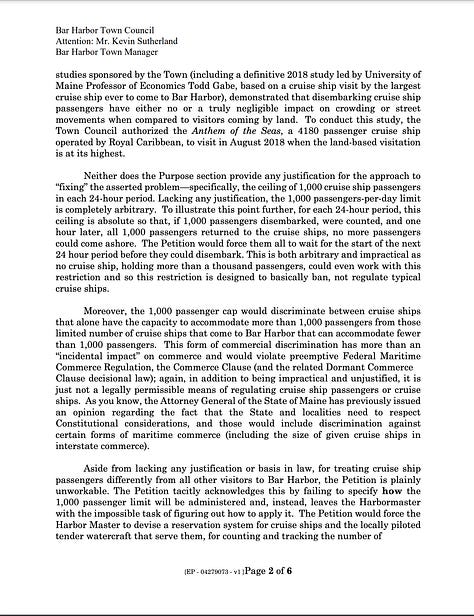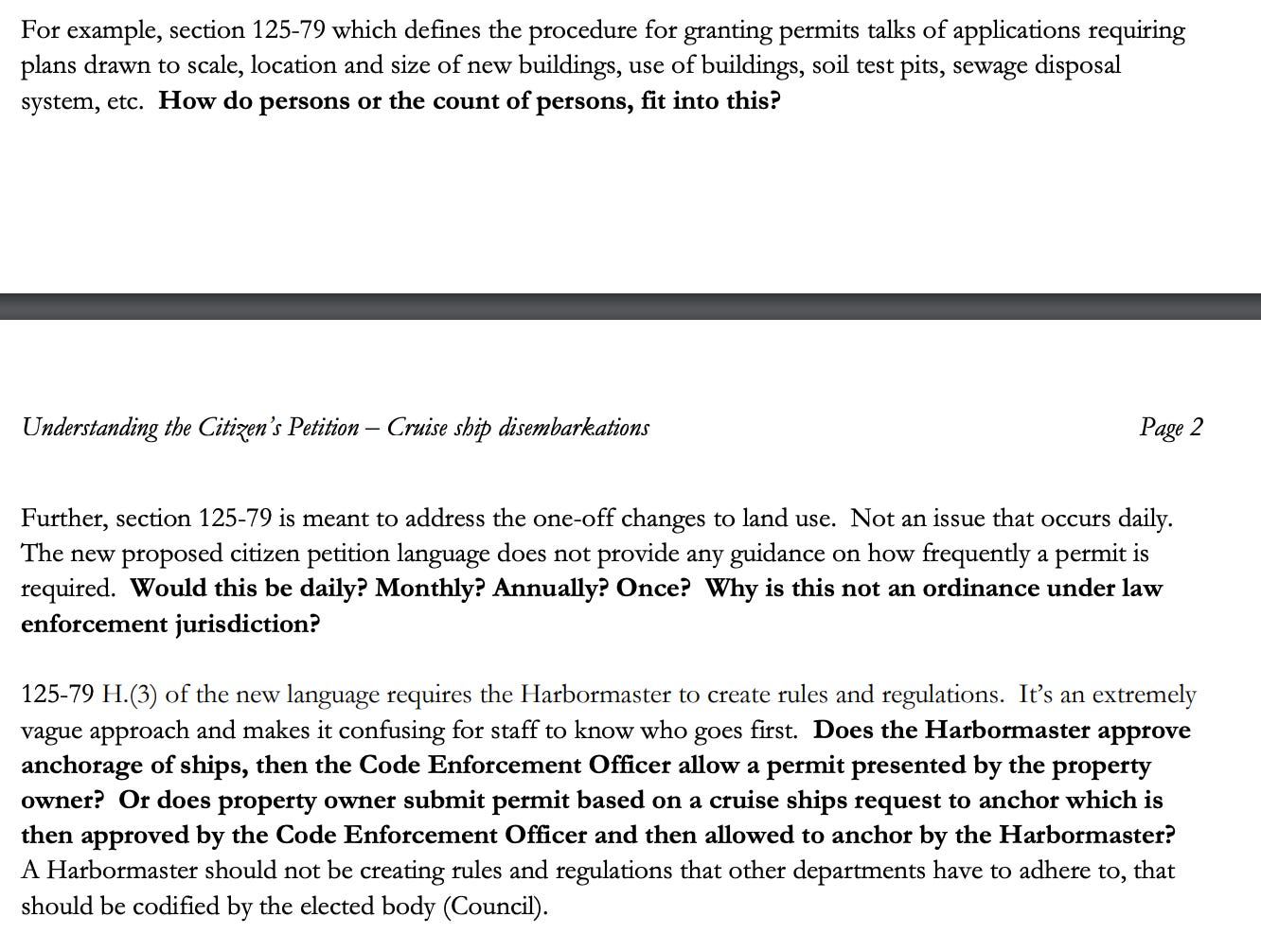Finding A Way To Make It Work: Town Searches For Ways to Make Cruise Ship Caps Happen and Worries Over Potential Lawsuits
Can Parking Funds Help Make Up for Lost Cruise Ship Revenue?
BAR HARBOR—Thanks to a vote this November, changes are coming to the town’s cruise ship scene, but exactly how those changes are going to be enacted are still being determined, according to Town Manager Kevin Sutherland.
Sutherland spoke at the Jesup Memorial Library on Wednesday to a group of six citizens, some of whom had advocated or created the citizens petition. The lead petitioner Charles Sidman was in attendance but didn’t speak during the informal session, which usually happens biweekly.
Sutherland met with Chris Wharff, the town’s harbormaster, Wednesday to review the changes. He’ll have another meeting in two weeks when Police Chief Jim Willis and Wharff are back from vacations.
The harbormaster has to develop rules and regulations to govern this process, which will start the implementation process that will recreate the harbormaster’s role in cruise ship disembarkations as well as the town’s. Currently cruise ship passengers disembark on private property, so there’s also an element of how does the town count disembarkations that occur on land which isn’t public.
“This whole year has been an experiment of the changes that the cruise ship committee did in 2019,” Sutherland said. Those changes had been delayed because of the COVID-19 pandemic. Now most busses pick up passengers on private property on West Street owned by Ocean Properties rather than down closer to the town’s pier.
That had a huge impact on reducing the congestion on the corner of West and Main, Sutherland said.
During the meeting, Sutherland spoke about how it can be difficult for the town staff to easily implement citizens’ petitions like the cruise ship’s disembarkation limit (passed 1,780 to 1,273) or the retail marijuana measures (did not pass) when petitioners don’t work with staff to vet all of the aspects to make sure the changes are doable. He referenced the marijuana petitioners inadvertently creating a zone that does not exist in Bar Harbor and licensing aspects as well as the cruise ship disembarkation cap creating a mechanism for counting passengers that currently does not exist. It also makes the harbormaster an element of the town’s land use ordinance.
It’s going to be a challenge to implement, he said. “I’ve been reflecting on this a lot because it’s kind of disheartening.”
In an August 19 letter to the Warrant Committee and Planning Board, Sutherland expressly stated that he was not representing the Town Council’s “voice on the matter” but town’s staff.
He went on to write,
The new plan calls for a cap of 1,000 disembarkations every day, and places its amendment into the ordinance section that concerns physical structures. The town must accommodate that via the permitting process, which he classified in August as confusing.
“I do have a strong feeling that we will have to address this in court,” Sutherland said Wednesday. “There are some risks….” Sutherland quickly mentioned that when the town talked to multiple attorneys this year, “They all say there’s a lot of risk here.”
Would the town win a lawsuit trying to overturn the changes?
“We don’t know the answer because there’s no good precedence that’s been set,” Sutherland said Wednesday.
In a July 18 letter to the town manager that was included in a council packet, attorney Andrew Hamilton from Eaton Peabody wrote,
One woman in attendance on Wednesday, who asked that her name not be disclosed, said that she believes the town does have a right to say how many come onshore.
“We all knew it was going to end up in court.” She appealed to Sutherland, “We want you to be brave. Sure, there’s going to be a lawsuit. Let’s go.”
“The council at no time took a strong position for or against” the question, he said. August 16 was the last day that the council could put something on the warrant for the November vote. The council couldn’t make the decision if the petition was legal or not. However, in hindsight, he believes that the questions about legality should have been discussed with the town attorneys in a more open forum.
“A lot of elderly people might not wanted for their taxes to go up,” he said if they’d known there could be a potential lawsuit.
“I’m concerned. I don’t know. I’ve only heard anecdotal pieces,” Sutherland said of lawsuits. “My concerns about suits are documented. If they show up, we’ll defend them the best we can. I’ve heard from some folks, some of whom may be sitting in the back of the room,” who have said they would support the town financially if needed.
“It’s not an easy topic. There’s a lot of emotions around it,” Sutherland said.
“What ever happened to Val Peacock? She was onboard with the 2,000,” one woman asked in reference to an early plan by the Town Council’s chair to reduce cruise ship disembarkations to 2,000 a day.
She was on the working committee this year, which created the memorandums of agreement with cruise lines according to lower berth capacities, Sutherland said.
“So she bent towards them,” the woman said.
“Not bent toward them, but understood the complexity,” Sutherland said.
FEE STRUCTURES
In that letter to the Warrant Committee, Sutherland had said that the petition would increase the need for town staff, requiring “at least two additional full-time staff in both the Police Department/Harbormaster (to count persons coming from a ship or ships) and from Planning/Code (to address permitting and violations).”
He wrote:
Making up for that money is a concern.
“Are we losing money?” that same woman asked.
“My concern is that the cruise industry might not pay any fees,” Sutherland said.
“You don’t see any need for the taxes to go up, correct?” she asked.
If the cruise lines decide not to pay for the fees, he said, there are some services that would be impacted and decisions would have to be made.
There’s $485,000 currently in the cruise ship fund, which is used for debt service for the ferry terminal, some of the sidewalk repairs and other things that they do downtown. Sidewalk fees could potentially shift to parking fees.
“If cruise ships stop coming altogether we wouldn’t have to check the water,” Sutherland said, but people could also lose their jobs. Those people could potentially include the parking enforcement staff and harbormaster’s staff.
He added that while the town’s collection of $2.2 million (not deducting credit cards and fees), there are state rules governing the use of those fees to things relating to streets (sidewalks, paving, road maintenance). Councilor Jill Goldthwait, he said, is working with legislators to try to loosen those regulations.
“We broke record,” he said. “We are extremely limited in what we can use those resources for.”
He added, “The other option is to stop doing certain things.”
One woman in attendance said the town’s cruise ship fees are ridiculously low and that she doesn’t believe the town’s Cruise Ship Committee should determine that.
She said of the cruise lines, “They’re such jerks. They’re powerful people. They think we’re little peons and they think they can crap on us.” She added that she hadn’t heard one person in support of cruise ships.
Many workers and business owners spoke against the cap at open council meetings throughout the summer and fall. Many others spoke in favor.
The town’s fee was based on lower berth capacity rather than disembarkations. Typically approximately 80% of that lower berth number (amount of beds for double rooms) come off the boat. They town was paid for the total berth capacity number.
PAST HISTORY
Sutherland said that he did a lot of work with the council in January trying to determine ways to reduce cruise ship congestion and numbers without getting into legal issues. The town’s plan would have made sure that no ships over 4,000 would have visited, Sutherland said.
“This issue is bigger than Bar Harbor,” Sutherland said. Bar Harbor and Acadia National Park are selling points for cruise lines. It’s also capable of intaking international commerce due to the establishment of TSA and customs. Not many Maine ports have that infrastructure point. And none have a national park.
“We’re a selling point. That’s why they want to come to Bar Harbor,” he said.
USING THE BAY FERRIES TERMINAL
Susan Sassaman asked if the town’s cruise ship intake could be at the Bay Ferries/Cat terminal on Route 3. “Could they tender everyone there?” she asked.
Sutherland said the south pier is beyond repair. “I don’t even want to put a piece of heavy equipment on it.”
The north pier is currently being used by Bay Ferries. Customs is right off that pier. So for the town to use that for cruise ship tendering, there would have to be an agreement with Bay Ferries and another with the federal government. The federal government authorization for cruise ships is currently via Ocean Properties.
The second question would be the transportation of cruise ship passengers in town or to the park, which would most likely have to rely on Island Explorer changes.
“There’s still a lot of logistics to work out,” Sutherland said including if the community is comfortable with that purpose at the ferry terminal location.
One community member said that a lot of people in town are hoping for a safe boat ramp, which she doesn’t believe currently exists in town. People also hope for some kind of marina, she said, but the space can’t contain too many things because of its size and current use.
The town would have to verify the disembarkation numbers which can’t be done just by counting people on tenders because not all people disembark. Some just ride on the bay and go directly back to the boat, which means that the tender number isn’t the same as the disembarkation number.
COMMUNITY SCHISMS
“How do we address this without ruining the community” is the question, Sutherland said.
He said that businesses are pitted against businesses. People are attacking council. People are attacking staff or the town manager. The harbormaster is caught in the middle of it.
“How can we get rid of the polarization?” one woman asked. That division is not just in the community, but throughout the state and nation.
She said that the community has shown the direction it would like to go, and the question is now moderating it and finding financial solutions and trying to find ways to support the community financially.
At the council’s goal setting session in early November, councilors discussed just that, Sutherland said.
“What can we do to support this town and allow it to flourish. That’s an area that we’re really going to be advocating for changes at the state level. We’re working on trying to be more vocal about what we’re working on when other things keep getting in the way,” Sutherland said.
THE NEXT MANAGER’S MINUTES
December 7.
It will focus on budget input; 4 p.m. to 6 p.m.; other questions and topics always encouraged during discussion.
December 21.
This will be a recap of the past calendar year and hopes and dreams for next year, 4 p.m. to 6 p.m.; other questions and topics always encouraged during discussion.
People are welcome to drop in at any time and do not have to stay for the entire session. All are held at the Jesup Memorial Library
SOURCES AND PLACES TO EXPLORE MORE
https://www.barharbormaine.gov/DocumentCenter/View/6303/Memo-to-WC-and-PB---Citizen-Petition?bidId
https://www.barharbormaine.gov/DocumentCenter/View/6303/Memo-to-WC-and-PB---Citizen-Petition?bidId
















